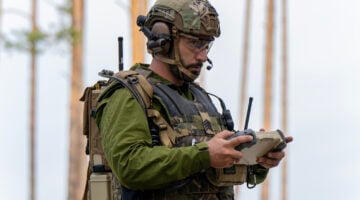
BEIRUT — In the middle of the day here, Beirut was rocked as three sonic booms caused by Israeli jets hit the city, breaking some glass windows and sending civilians scattering. It’s a move that seemed design to send a message to Hezbollah as the region waits on tenterhooks to find out if — or more likely, when — the Lebanese-based group launches an attack on Israel.
It also seemed timed to coincide with a speech by Hezbollah Secretary General Hassan Nasrallah, who was set to speak at the one-week memorial of Fuad Shukr, a top Hezbollah officer killed in a July 30 Israeli strike in the suburbs of Beirut. But the Hezbollah leader dismissed the show of force in his opening comments as “very childish” before promising that the conflict will come, at a time of the group’s choosing.
“Our response is coming and it will be strong and effective,” Nasrallah said. “Regardless of any consequences, the [anti-Israel] resistance cannot let the assassination go unpunished. God willing, our response will come, whether separately or together with the axis [of resistance],” Nasrallah stressed today, referring to a coalition of Iranian-backed groups.
He did not specify a timeline for the retaliation, nor whether it will be an orchestrated attack from Iran and Hezbollah simultaneously.
“The Americans thought that Iran would respond at dawn on Monday, but this turned out to be untrue. The Israeli wait for the response is part of the response and the punishment, because the battle is psychological, moral and military,” he added.
Nasrallah confessed that Shukr’s killing is an “Israeli achievement” but he assured that it is not a “victory.” He said that his assassination is a “big loss” but it “won’t weaken Hezbollah.”
Last week’s strike on Shukr, who was designated by the US Department of State as “a Specially Designated Global Terrorist” for his purported role in bombing of a US Marine Corps barracks in Beirut that killed scores of Americans in the 1980s, was only the second time Israel has struck Beirut since the start of the regional conflict following the Oct. 7 attacks in Israel.
On The Ground On Both Sides Of The Border
- In South Lebanon, empty villages, ruined crops and fears of what comes next
- In Northern Israel, emptied villages and talk of war in Lebanon
Iran has also vowed retaliation for the death of Hamas political chief Ismail Haniyeh, who was assassinated in Tehran hours after the strike on Shukr. Iran’s supreme leader, Ayatollah Ali Khamenei said last week in a statement, “we consider it our duty to take vengeance” for Haniyeh’s death, and considered that he was a “dear guest in our house.”
“The battle’s objective now is not to eradicate Israel but rather to prevent it from winning,” Nasrallah said, adding that, “no one in Lebanon or outside Lebanon should ask us to treat [Israeli strike on Beirut] as being normal.
As the clashes escalate on Lebanon’s southern border with Israel, and with intensified fears and threats that the limited border clashes will lead to a full-scale war, Nasrallah said that “the Israeli danger cannot be faced by playing ostrich and running away from the storm, because the enemy [Israel] fights without red lines. What is needed is confrontation, not hesitation and submission,” he continued.
In the week since the attacks, many countries have called for their nationals to leave Lebanon as fears of heightened conflicts increase. Beirut’s International Airport has, during the last few days, seen jammed departure terminals as large numbers of people flee from the country.
In the meantime, the region — and the Lebanese people — are left in a state of flux.

